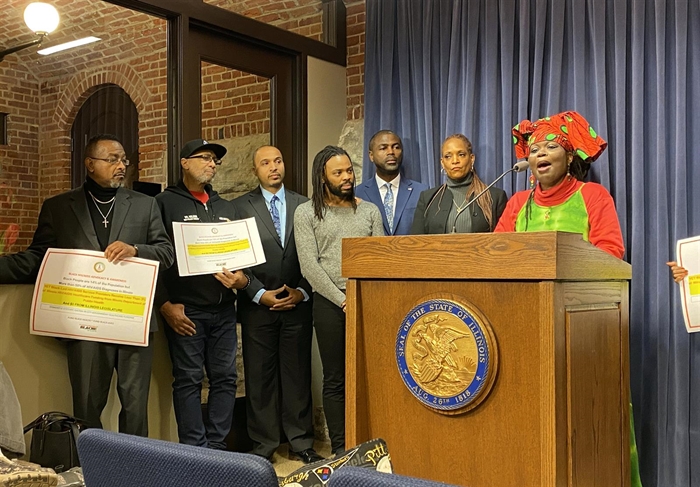SPRINGFIELD – Illinois lawmakers and advocates commemorated National Black HIV/AIDS Awareness Day Tuesday, calling attention to the disproportionate impact the disease has on Black communities.
“It’s important that we commemorate or we talk about that on February 7, so that we can spark a debate with all of our public health providers across the state to understand that this is a public health crisis,” said state Sen. Mike Simmons, D-Chicago. “We cannot continue to lose Black life to HIV/AIDS.”
Simmons and other members of the Illinois Legislative Black Caucus were joined by members of the Black Leadership Advocacy Coalition for Healthcare Equity, or BLACHE, a coalition of Black-led organizations that work to prevent and treat HIV and AIDS in the Black community. The lawmakers and advocates called for the state to invest more money in organizations treating the disease in communities of color.
The advocates called attention to the fact that Black people make up a disproportionate number of new HIV diagnoses. Data from AIDSVu, an interactive data tool presented by Emory University’s Rollins School of Public Health, showed in 2020 Black people comprised 52.1 percent of HIV diagnoses in Illinois despite making up roughly 15 percent of the population.
“There are many white-led organizations that are hosting celebratory events today. They’re celebrating Black lives, that is true. They are celebrating Black organizations that have overcome,” BLACHE chair Creola Kizart Hampton said at the news conference. “But we must approach this even more from an attitude of solemness because it is a solemn day for the Black community.”
They also called for greater investment in a 2006 law known as the African American HIV/AIDS Response Act, which created a fund to specifically address the disproportionate impact the disease has on the Black community.
According to Simmons, however, the law has not done much to address the disparity, and the Illinois Comptroller’s state fund database showed it had a balance of about $4.2 million as of Thursday.
“So we have not moved the needle on this pandemic in the Black community. We must acknowledge that today,” Simmons said.
Of the Illinois Department of Public Health’s total budget for HIV services, less than a third, or roughly $29.6 million, was used for grants last year, according to an agency spokesperson, and Black-led organizations received $2.5 million, or about 8 percent of that funding last year.
The budget, primarily funded by the federal government, contains another $70 million to be allocated toward required services including rapid test kits that are distributed to grantee agencies and professional service contracts.
At the news conference, the BLACHE representatives included leaders from various Black-led organizations aimed at HIV/AIDS prevention and treatment. They all said they had applied for grants from the program but were denied over the years.
Last September, Hampton said she met with IDPH representatives to discuss HIV/AIDS funding to Black-led organizations and was questioned about potential reasons for the funding disparities.
“Well, maybe they aren’t applying for it. Or maybe they don’t qualify for it. Or maybe there aren’t enough Black-led organizations that are out there that know about it,” Hampton said she heard from IDPH. “Or maybe they don’t have the grant writers that they need. Maybe they don’t have – There are reasons and there are excuses.”
Rep. Justin Slaughter, D-Chicago, compared the HIV/AIDS data points to a larger problem faced by the Black community.
“It mirrors the status of Blacks in our Department of Corrections prison system. Exactly, to the tee,” Slaughter said.
According to the Illinois Department of Corrections, Black people made up 53 percent of the state’s prison population in 2020 despite making up roughly 15 percent of the state’s general population.
“We are here to take this to the next level in terms of bringing these initiatives to life, getting resources down to the ground level in our communities, and in our neighborhoods,” he added.
If they had the funding, Hampton said the organizations would focus on prevention. That includes PrEP, a medication used to reduce an individual’s chances of getting HIV. In addition, Hampton said they need to make sure HIV-positive individuals are on the necessary medication to avoid infecting others through intercourse.
“So we have available free medications that are available to our communities but many of them aren’t aware of it,” Hampton said.
Because of the lack of awareness that comes with minimal funding, Hampton said, a large part of the Black community is unaware of the steps they can take to protect themselves from HIV/AIDS.
But Rep. Camille Lilly, D-Chicago, who was the lead sponsor on a massive health care reform bill passed in 2021, said HIV/AIDS is only one part of the health disparities faced by Black communities in Illinois.
“Many of us are dying from AIDS but we’re dying from so many other illnesses because of the health disparities,” Lilly said. “We don’t have education. We don’t have opportunity. We don’t have housing. We don’t have health care.”

